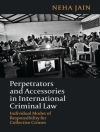The European Yearbook of Constitutional Law (EYCL) is an annual publication initiated by the Department of Public Law and Governance at Tilburg University and devoted to the study of constitutional law. It aims to provide a forum for in-depth analysis and discussion of new developments in the field, both in Europe and beyond.
This inaugurate volume examines the safeguards and limits of judicial power in a variety of constitutional systems, both at the national and supranational level. The book approaches the judiciary as part of the constitutional system operating within a legal order that connects the citizens and institutions of the state to each other. Looking at the judiciary from this broader perspective, the traditional doctrine of the separation of powers would appear no longer to adequately represent the diversity and complexity of constitutional systems and their democratic legitimacy. Judicial independence does not mean isolation, but should better be understood as institutionalizing relationships that legitimize the power of the courts. The notions of ‘safeguards’ and ‘limits’ indicate the reciprocally enabling and protecting nature of these relationships. In recognition of this, the contributions to this volume analyse these safeguards and limits as relations existing within a complex constitutional architecture.
State institutions, today, are involved in a fundamental transformation of their selfunderstanding as a result of changes in political culture. Several contributions to this volume provide examples of political criticism and pressure on the judiciary, against which the usual guarantees are unable to provide adequate protection. A convincing and effective response to threats to the judiciary’s independence requires a detailed and precise analysis of the judiciary’s constitutional safeguards and limits. This book offers a step in that direction.
قائمة المحتويات
Chapter 1. Introduction: Safeguards and Limits of Judicial Power.- Chapter 2. The Independence of the Belgian Constitutional Court.- Chapter 3. Between Judicial Independence and Democratic Accountability: The Function and Legitimacy of the German Federal Constitutional Court.- Chapter 4. Italy and its Constitutional Court.- Chapter 5. Bipolar Constitutionalism in The Netherlands and its Consequences for the Independence and Accountability of the Judiciary.- Chapter 6. ‘… destroy all sense of dependence’: On the Selection and Independence of the Judiciary in Norway.- Chapter 7. Judicial Independence and Accountability in the British Constitution.- Chapter 8. Independence and Accountability of the South African Judiciary.- Chapter 9. Judicial Independence and Accountability in the Council of Europe and the European Court of Human Rights.- Chapter 10. Accountability through Transparency and the Role of the Court of Justice of the European Union.- Chapter 11. The Last Soldier Standing? Courts versus Politicians and the Rule of Law Crisis in the New Member States of the EU.- Chapter 12. The Last Soldier Standing? Courts versus Politicians and the Rule of Law Crisis in the New Member States of the EU.- Chapter 13. The Strasbourg Court: Judges Without Borders.- Chapter 14. The Strasbourg Court: Acting Within its Limits.












